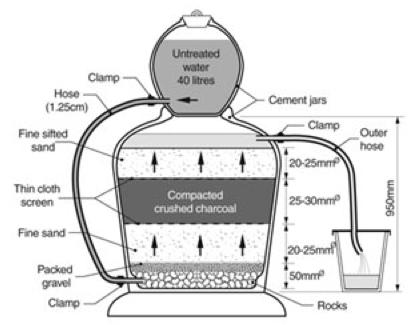Difference between revisions of "Charcoal filter / Activated carbon"
From Akvopedia
| Line 2: | Line 2: | ||
[[Image:Ceramic_filter_icon.png|right]] | [[Image:Ceramic_filter_icon.png|right]] | ||
[[Image:charcoal filter.jpg|thumb|right|250px|The Unicef upflow charcoal filter. <br>Photo: WHO.]] | [[Image:charcoal filter.jpg|thumb|right|250px|The Unicef upflow charcoal filter. <br>Photo: WHO.]] | ||
| + | |||
| + | Charcoal can be quite effective at removing some tastes, odours, and colour. Ordinary charcoal available locally could be used, but activated carbon is more effective, though rather expensive. An example of such a filter is the UNICEF upflow sand filter. However, if the charcoal is not regularly renewed or if the filter is left unused for some time, there is evidence that it can become the breeding ground for harmful bacteria. | ||
==Acknowledgements== | ==Acknowledgements== | ||
* [http://www.who.int/water_sanitation_health/hygiene/envsan/tn05/en/index.html Emergency treatment of drinking water at point-of-use.] WHO. | * [http://www.who.int/water_sanitation_health/hygiene/envsan/tn05/en/index.html Emergency treatment of drinking water at point-of-use.] WHO. | ||
Revision as of 05:47, 10 July 2012
| |
Charcoal can be quite effective at removing some tastes, odours, and colour. Ordinary charcoal available locally could be used, but activated carbon is more effective, though rather expensive. An example of such a filter is the UNICEF upflow sand filter. However, if the charcoal is not regularly renewed or if the filter is left unused for some time, there is evidence that it can become the breeding ground for harmful bacteria.

